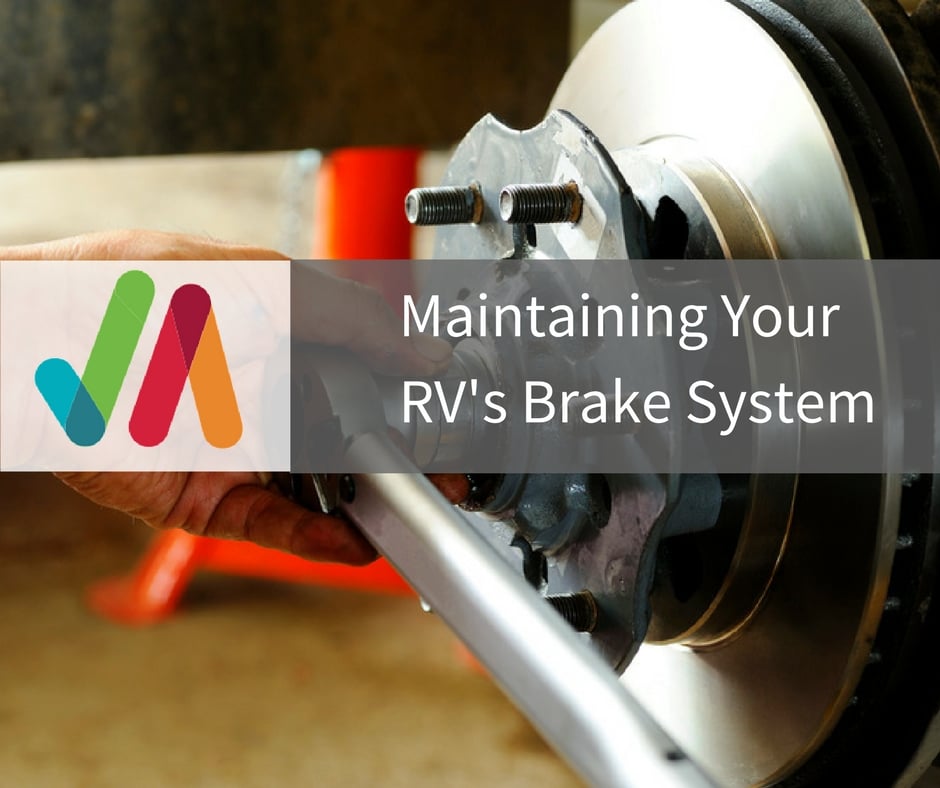 We’ve spent some time in the past talking about different types of braking systems and how they work, but how do you know when you need to get your brakes serviced? Are there different rules for motorhomes and fifth-wheels? Read on to learn more!
We’ve spent some time in the past talking about different types of braking systems and how they work, but how do you know when you need to get your brakes serviced? Are there different rules for motorhomes and fifth-wheels? Read on to learn more!
Motorhome brakes
Motorhomes typically have two separate braking system options: air brakes and hydraulic brakes. If your rig is diesel-powered, it’s most likely equipped with an air brake system. This option is advantageous in that air brakes don’t need fluid to run, meaning one less thing you need to check or replace. They also function without master cylinders that can be prone to failure, which is another benefit of these systems. However, there are a few things you should look out for if your motorhome uses air brakes.
If excess moisture gets trapped in the air system, it can cause brake failure, so most of these systems come with a replaceable cartridge that works to dry up any unwanted fluid or oil. If this filter becomes clogged, it can cause low air pressure, which will result in brake failure. In order to keep the system working optimally, check this cartridge at least once a year, and plan to replace it once every two or three years. You may also want to consider carrying a spare with you in case of an emergency. Additionally, it’s a safe practice to manually drain the system’s air storage tank every six months to ensure there’s no moisture contamination.
If your motorhome uses a hydraulic brake system, you’ll want to do a thorough inspection annually to check the rotor, brake pads, drums, and linings for any wear-and-tear that may cause problems.
To start, take a look at the master cylinder. As your brake pads and linings wear away, the fluid level in the reservoir will decrease as well, meaning you’ll need to give it a refill every once and a while. When you add brake fluid, check the cap and the tank for any contaminants, like debris or rust, and flush the system if they’re present. You’ll also need to do a complete replacement of the brake fluid every two years to keep its boiling point high, preventing excess evaporation.
When it comes to the rotors, check to make sure they look smooth and free of any deep grooves, cracks, or discolored heat spots. Measure your brake pads from the metal backing plate to the rotor surface and top to bottom to make sure they’re wearing evenly. It’s also good to double-check for rust on the system (especially if you live in a humid or rainy area), as the corrosive buildup will cause reduced braking capacity and uneven wear.
Fifth-wheel brakes
If your mobile home is a fifth-wheel trailer, there are three main areas of maintenance you should focus on: inspection, cleaning, and adjustments. Similar to a motorhome, you should have your trailer’s brakes inspected at least annually, and maybe more frequently depending on their performance. When checking your brakes, begin by looking for worn shoe linings. If the linings are less than 1/16-inch thick, or if they’re cracked, separated or saturated with oil, you’ll need to completely replace the shoes. You should also inspect the magnet arm for any loose or worn parts, and replace any missing or damaged items. It’s wise to replace items for the entire axel if one side needs a new part to keep all like components on the same axel the same age.
Clean each brake assembly on your fifth-wheel with a soft, damp brush or rag to eliminate dust and debris that may affect brake performance. Before reassembling any components you may have taken apart during inspection, apply a little bit of lithium grease to the areas behind the shoe to lessen wear from the backing plate.
Since electric brakes aren’t self-adjusting, you’ll need to periodically adjust them to keep the shoes and drums properly spaced. You can do this yourself if you’re especially handy in the auto field, or you can have a professional take care of it. Simply be aware of the condition your brakes are in, and have them adjusted if you notice them getting hot while driving or having trouble holding.
Regular inspection and service of your motorhome or fifth-wheel brake system is crucial to keeping your rig street safe. Utilizing your online RV maintenance logbook and schedule on www.maintainmyrv.com can help remind you to regularly check and care for your brakes to guarantee secure stops no matter where the road takes you.
